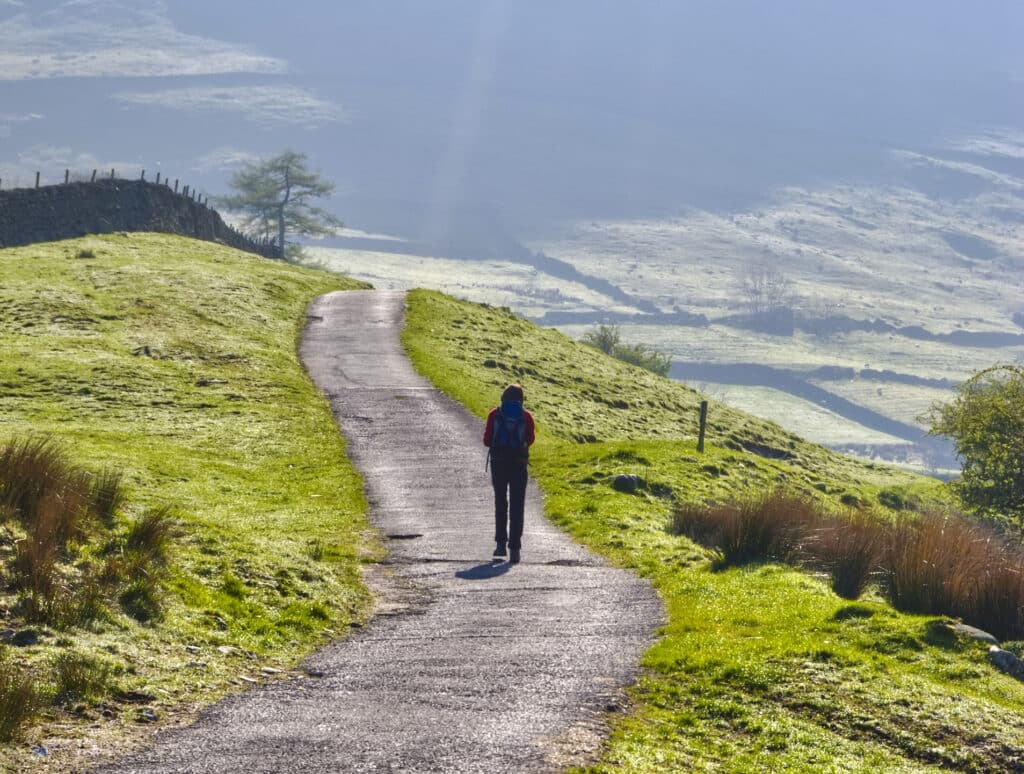A Heart In Search Of God: Walking To Deepen Our Faith

Over half a century ago, aged 6 or 7, sitting in the back of the family Morris Minor, I glimpsed a gaunt man striding along bearing a haversack: weather-beaten face, dishevelled white hair and beard, and long flapping coat. My father said he might be an ex-soldier, scarred by war, who had taken to the road. To me the “tramp” looked brave, independent and free. I wanted to walk like him, with nothing except what I could carry, so I pestered family and friends to hike with me.
In 2021 I retired as CEO of Caritas Social Action Network (CSAN), the domestic social action agency of the Catholic Church in England & Wales, and started to reflect on next steps. After many dead ends, I discovered that walking was what gave me energy, joy and peace, and discerned that through walking pilgrimage I could contribute to the mission of the Church.
Pilgrimage is ancient and universal, but it’s always an inner journey as well as outer. On a visit to Santiago de Compostela in 2010 Pope Benedict XVI defined it beautifully: “To go on pilgrimage really means to step out of ourselves in order to encounter God where he has revealed himself, where his grace has shone with particular splendour and produced rich fruits of conversion and holiness among those who believe.”
In 2008 I stepped out of my usual role as a GP in Bristol to set off alone from Canterbury to Rome. I was often asked, “Is it a pilgrimage?” I obfuscated, unsure what it means to be a pilgrim in a secular age and reluctant to be pigeonholed. On the road I became a pilgrim because of how those I encountered welcomed me. I wrote a book about the journey, called Rome Alone. In 2015 I tramped on to Istanbul and wrote The Dusty Roads of History.
I discovered that walking pilgrimage is a great way of experiencing our physical environment, exercising, encountering people different from ourselves and of promoting local tourism; all much needed after the Covid-19 pandemic. In an age of global warming, walking pilgrimage in our home nations is a greener option. There is a distinctive spirituality associated with walking pilgrimage because of its closeness
to the earth, the slowness of travel and the blend of solitude, fellowship and encounter with strangers it involves.
Pope Francis has said of pilgrims: “Whoever they may be – young or old, rich or poor, sick and troubled or curious tourists – let them find due welcome, because in every person there is a heart in search of God, at times without being fully aware of it.”
The phrase “heart in search of God” is the inspiration for my three-year project to promote walking pilgrimage in England and Wales by developing Pilgrim Ways in each Catholic diocese. The Ways are an opportunity for Catholics and other Christians to deepen their faith and for people of all faiths and none to share the experience of walking pilgrimage in a Catholic context.
The Ways start at the cathedral of the diocese and end at a shrine within the diocese. They take in churches and places of relevant historical interest. They are off-road as much as possible and incorporate existing pilgrim routes and long-distance footpaths.
The cathedrals, shrines and churches along each Way will be encouraged to provide a simple welcome, for example by keeping the church porch open during some daytime hours and providing a stamp for pilgrims to stamp their pilgrim passports.
In most dioceses there is no existing Way, but the Diocese of Leeds has the two-day St Wilfrid’s Way, and Lancaster has the six-day St Mary’s Way. In Southwark there is the Augustine Camino and in Arundel and Brighton there is an annual ecumenical walking pilgrimage: Pilgrims Live! Nationally there is the new London to Walsingham Camino and Pilgrim Cross (formerly Student Cross) to Walsingham in Holy Week. These walks provide models and inspiration for this project.
Key to the project is a new website, www.pilgrimways.org.uk, a platform for the walking guides as well as for spiritual and practical resources. There are downloadable pilgrim “passports” and certificates for pilgrims who complete the Ways. The project is supported by the Sisters of the Holy Cross CIO.
The 2025 Holy Year has the motto “Pilgrims of Hope”. Why not prepare for the Jubilee by undertaking a walking pilgrimage of hope in your own diocese?
What's Your Reaction?














